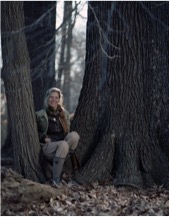Linking Remote Sensing and Carbon Research with Forest Protection

Recording >> |
Slides [PDF] |
 |
Joan Maloof is a writer, an ecologist and a conservationist with a unique voice in today’s times. She has studied and worked with plants her entire life; her formal education includes a bachelor’s degree in Plant Science, a master’s degree in Environmental Science, and a Doctorate in Ecology. She is a professor emeritus at Salisbury University where she taught Biological Sciences and Environmental Studies. Maloof has published numerous research articles in publications such as Ecology; American Journal of Botany; and the International Journal of Environmental Studies. Maloof’s books include Teaching the Trees (2005), Among the Ancients (2011), and Nature’s Temples: the Complex World of Old-Growth Forests (2016). In addition to her research and writing, Maloof founded an organization with the goal of creating a network of protected forests across the US. That organization, the Old-Growth Forest Network, now has thousands of supporters. Maloof travels widely to educate others regarding the extent and condition of our forests, and to encourage their preservation. |
| About the Talk Forests that have never been substantially disturbed by humans go by many names: primary forests, virgin forests, and old-growth forests. These forests are important as repositories of biodiversity and carbon. Formerly considered as carbon neutral, they are now recognized as being important carbon sinks. Dr. Joan Maloof has likely visited more US old-growth forests than anyone alive today. During this talk she will describe the mission of the Old-Growth Forest Network, an organization she founded. Maloof will also discuss the data types and delivery methods needed to link carbon research with forest protection. Examples of topics include: 1. Determining locations of old-growth forests remotely, 2. Linking forest age with carbon flux, 3. Creating scale-appropriate carbon flux maps, and 4. Need for remote carbon uptake verification for the carbon offsets market.
|
|
|
For upcoming events, check out CMS Applications Policy Speaker Series.
Your suggestions for future speakers or feedback about our series are welcomed. Contact the Applications Team.
- NASA Official: Jon Ranson
- Curator: Leanne Kendig
